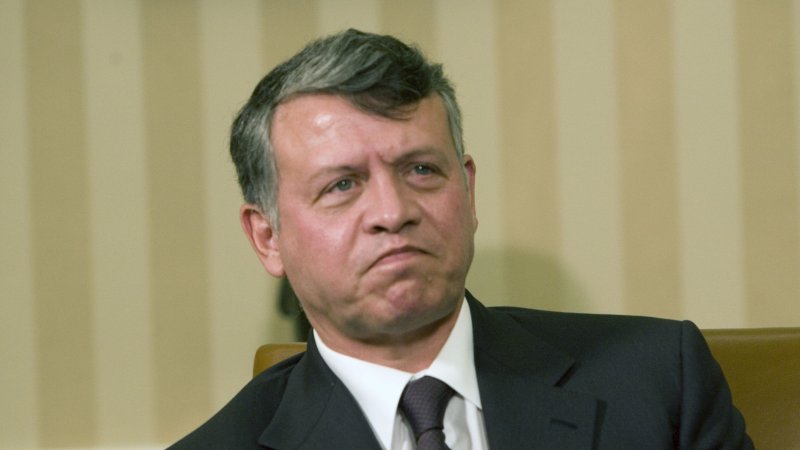King Abdullah II of Jordan. UPI/Dennis Brack/Pool |
License Photo
AMMAN, Jordan, May 3 (UPI) -- King Abdullah II of Jordan has sworn in a new government in a long-running political drama in which the Hashemite kingdom's vaunted intelligence service, a close U.S. ally in the fight against al-Qaida, plays a critical role.
Indeed, the Dairat al-Mukhabarat al-Ammah, or General Intelligence Directorate, often seems to be at odds with the monarch's avowed intent to introduce political reforms.
That's a policy that has taken on greater urgency for the monarch who has seen four longtime Arab dictators swept from power in the pro-democracy uprisings that erupted across the Middle East in January 2011.
The GID has long been a pillar of the monarchy, as intelligence services have been for other Arab regimes, and as such it is widely seen as a powerful arm of the regime that is used to stifle, or crush, dissent.
Over the years, heads of the GID have often seemed interchangeable with prime ministers.
So one of the main demands of the growing body of protesters, led by the Muslim Brotherhood, seeking sweeping reforms, is the curbing of GID's powers.
The International Crisis Group, a Brussels think tank and conflict resolution center, observed in a March analysis of popular protest in Jordan, that "ending -- or at least dramatically reducing -- the political role of unelected bodies, the security services prime among them," would go a long way to dampening the protest movement.
Since he ascended the throne in 1999 following the death of his much-revered father, King Hussein, Abdullah has constantly changed prime ministers and shuffled Cabinets to ward off persistent demands for political and economic reform or to bolster support among the Bedouin tribes.
They have formed the backbone of the monarchy since it was established by Britain after World War I in what was then known as Transjordan.
A week ago, Prime Minister Awn Shawkat al-Khasawneh, a prominent jurist, suddenly resigned only six months after Abdullah had appointed him to replace Marouf al-Bakhit, a former army major general and ex-head of the GID.
On Wednesday, the king swore in Khasawneh's successor, Fayez al-Tarawneh, a U.S.-educated leading conservative.
He is the 10th prime minister Abdullah has named in his 13-year-old reign, and the fourth in the last 14 months, the period that covers the political convulsions of the so-called Arab Spring.
These changes have all been triggered by the growing pressure for change in an Arab state that's squeezed between Israel, Saudi Arabia, Iraq and Syria, one of the most volatile regions on the planet.
Abdullah has found himself trapped: promising reforms that are blocked by conservative forces, such as the intelligence service and the Old Guard who run the royal court who don't want to see their power and privileges taken away.
Khasawneh's surprise resignation -- submitted by letter while abroad -- illustrates the intrigues behind the political maneuvering in Jordan.
The royal palace, apparently taken unawares and anxious to deflect criticism of the king, put it about that Khasawneh was less than enthusiastic about reform but insiders say he was frustrated at how his efforts to bring about meaningful political change were being sabotaged by the power elite.
Politicians said he had been caught up in a power struggle with the GID, which is accused of widening its already formidable influence into public life.
But the key element appears to have been Khasawneh's drive to root out deeply entrenched official corruption, a campaign that led to judicial probes against senior establishment figures.
"Khasawneh took office widely seen as a reformist and a liberal politician … sharply critical of how the country was being managed," said political analyst Mohammad Abu Rumman of the University of Jordan.
"He expressed his intention to bring an end to intervention by the intelligence department in public affairs."
Several GID chiefs have been implicated in corruption in recent years and two have served jail time. But Abdullah has dismissed others he thought were becoming too involved in politics, the preserve of the royal court.
Khasawneh's predecessor, Bakhit had promised to change elections laws, decentralize authority and give political parties more rights.
Islamists accused him of stalling on reform and being lenient on corruption. Abdullah accepted his resignation Oct. 17, 2011.
Insiders predict Tarawneh's tenure will likely be brief. Meantime, they say, Abdullah's running out of time.





